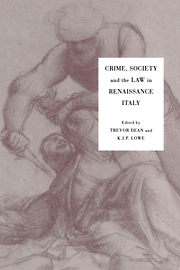Book contents
- Frontmatter
- Contents
- Illustrations
- List of contributors
- Preface
- 1 Writing the history of crime in the Italian Renaissance
- 2 Criminal justice in mid-fifteenth-century Bologna
- 3 The judicial system in Florence in the fourteenth and fifteenth centuries
- 4 The incidence of crime in Sicily in the mid fifteenth century: the evidence from composition records
- 5 Theology, nature and the law: sexual sin and sexual crime in Italy from the fourteenth to the seventeenth century
- 6 Practical problems in the enforcement of Italian sumptuary law, 1200–1500
- 7 The prince, the judges and the law: Cosimo I and sexual violence, 1558
- 8 Intervention by church and state in marriage disputes in sixteenth- and seventeenth-century Florence
- 9 The writer and the man. Real crimes and mitigating circumstances: il caso Cellini
- 10 The political crime of conspiracy in fifteenth- and sixteenth-century Rome
- 11 Fighting or flyting? Verbal duelling in mid-sixteenth-century Italy
- 12 Banditry and lawlessness on the Venetian Terraferma in the later Cinquecento
- 13 Mihi vindictam: aristocratic clans and rural communities in a feud in Friuli in the late fifteenth and early sixteenth centuries
- Index
6 - Practical problems in the enforcement of Italian sumptuary law, 1200–1500
Published online by Cambridge University Press: 14 October 2009
- Frontmatter
- Contents
- Illustrations
- List of contributors
- Preface
- 1 Writing the history of crime in the Italian Renaissance
- 2 Criminal justice in mid-fifteenth-century Bologna
- 3 The judicial system in Florence in the fourteenth and fifteenth centuries
- 4 The incidence of crime in Sicily in the mid fifteenth century: the evidence from composition records
- 5 Theology, nature and the law: sexual sin and sexual crime in Italy from the fourteenth to the seventeenth century
- 6 Practical problems in the enforcement of Italian sumptuary law, 1200–1500
- 7 The prince, the judges and the law: Cosimo I and sexual violence, 1558
- 8 Intervention by church and state in marriage disputes in sixteenth- and seventeenth-century Florence
- 9 The writer and the man. Real crimes and mitigating circumstances: il caso Cellini
- 10 The political crime of conspiracy in fifteenth- and sixteenth-century Rome
- 11 Fighting or flyting? Verbal duelling in mid-sixteenth-century Italy
- 12 Banditry and lawlessness on the Venetian Terraferma in the later Cinquecento
- 13 Mihi vindictam: aristocratic clans and rural communities in a feud in Friuli in the late fifteenth and early sixteenth centuries
- Index
Summary
Between 1200 and 1500 governments in over forty Italian cities enacted more than 300 laws designed to restrict and regulate the consumption of luxury goods and related manifestations of excess. Although many of the laws consisted simply of isolated rubrics within a larger statute, others were given the full title of legge suntuaria, or sumptuary law. The name derives from the leges sumptuariae of ancient Rome which, though originally denoting only the regulation of dining habits, came to be applied by historians to all Roman laws which regulated spending (sumptus), particularly on luxury goods. The Italians classed many prohibitions concerned with manifestations of excess other than luxury as leggi suntuarie: loud wailing and weeping at funerals and disorderly conduct at wedding festivities and banquets were just some prohibited activities. There were, in fact, few aspects of the private and public customs, habits and dress of their citizens with which Italian law-makers did not concern themselves. The question to which this gives rise is why, in a period of economic expansion, Italian governments felt the need to restrict and regulate the lives of their citizens in this way.
In the nineteenth and twentieth centuries, attempts to explain this preoccupation have often been made by linking it to particular types of government, sets of religious beliefs or geographical location, or to misogyny or paternalism in government.
- Type
- Chapter
- Information
- Crime, Society and the Law in Renaissance Italy , pp. 99 - 120Publisher: Cambridge University PressPrint publication year: 1994
- 2
- Cited by



